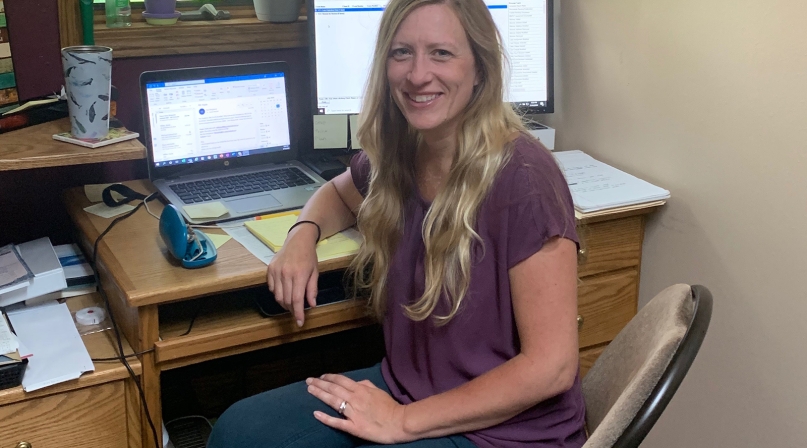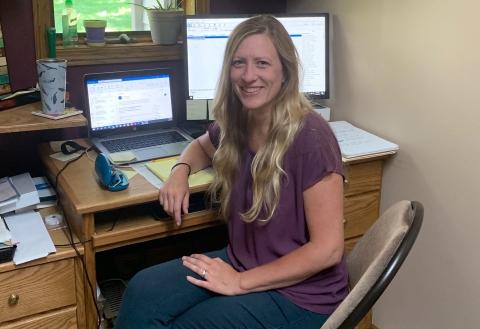Faces on the Frontline: Probation Officer Hallie Metcalf
Author
Upcoming Events
Related News

“Addiction doesn’t go away because we’re having a pandemic,” said Hallie Metcalf, an Otter Tail County, Minn. DWI court probation officer.
Metcalf and her colleagues at the Otter Tail County Probation Department have transitioned to find new ways to help clients who are battling addiction during the COVID-19 public health crisis.
Here’s a look at how Metcalf continues her work as a DWI probation officer amid the pandemic.
Mornings
Metcalf, like many other county employees, has found herself spending some days each week working from home instead of heading to the office.
She starts her mornings with a workout before heading to her home office if she has no scheduled in-person visits, which she completes in addition to seeing clients virtually.
Learn More
The transition to working from home was initially a challenge for Metcalf. She had to find a balance between teleworking and her children also telelearning at home. Metcalf also had to deal with the challenging aspect of the “hands on” DWI court limiting in-person contacts.
“We have contact with our clients on a very regular basis,” she said. “All of a sudden we had to think, ‘OK, how are we going to keep those contacts going?’”
Metcalf had to find the best ways to communicate with clients based on their type of cell phone and access to the internet to ensure they were able to stay connected to treatment. She’s turned to Skype to reach the majority of her clients.
“Virtual is the next best because you’re still seeing their body expressions, you’re still seeing their environment a little bit,” she said.
Additional services also transitioned to being held virtually, such as Alcoholics Anonymous (AA) meetings for clients still in treatment.
“A lot of these people rely upon staying connected in the community and staying connected with their sober networks and so the AA community really picked up and did a great job of being able to hold their meetings virtually,” Metcalf explained.
Previously, court hearings were also held over Zoom before the recent reopening of the courthouse, where precautions are in place to prevent the spread of the virus, including prescreening employees and clients.
Afternoons
Metcalf still makes home visits and conducts drug testing out in the field, despite the pandemic.
“I still go out and see people on a regular basis face to face and so I haven’t lost all of that,” she said. “I’ve pulled back a little, but we’ve still been able to be in their homes and have some eyes and ears in those situations.”
If the weather is nice, Metcalf will meet with clients outside. She wears gloves when drug testing.
When it comes to returning to the office, the Otter Tail County Probation Department has been rotating which officers are in the building to prevent having all the agents present at the same time.
Clients must make appointments and other precautions have been implemented including socially distancing chairs in the waiting room, setting up plexiglass and wearing masks.
“We’re taking the standard precautions that a lot of the businesses do,” Metcalf said.
Evenings
Metcalf said at the end of the day, the COVID-19 outbreak has increased her workload.
“I’ve probably seen people whether it’s virtually or in their home more so than I did prior to COVID,” she said. “I just don’t want to lose that connection, so I feel like we’ve definitely increased contacts.”
Metcalf explained how the DWI program has four phases. As clients complete each phase, there is typically less contact with the probation department but because of the pandemic, officers decided to sustain these communications for all phases.
“We’ve been seeing people on a regular basis weekly throughout this whole pandemic,” she said. “We’ve been able to have lots of hands-on and know where the struggle is and if the struggle is coming up, hopefully be able to put those fires out before it gets too big.”
The most significant way the COVID-19 outbreak has impacted Metcalf’s routine is when it comes to thinking out of the box to find ways to stay connected with clients.
She has been holding weekly challenges to engage clients using activities like bingo, scavenger hunts, flower planting, journaling and gratitude challenges.
“Our participants also stay connected with one another and when they’re not able to attend their meetings or attend court sessions in person, they’re kind of losing that connection, too, so we’re trying to keep them engaged with one another as well,” she said.
Metcalf said she still is able to test clients throughout the pandemic and help celebrate their milestones for certain marks of sobriety.
“We need to meet our clients where they’re at and we need to continue to just help them and support them and not just pause because there is a pandemic,” she said.

Attachments
Related News

USDA and HHS release new dietary guidelines
On January 7, U.S. Department of Agriculture Secretary Brooke Rollins and U.S. Department of Health and Human Services Secretary Robert F. Kennedy, Jr. unveiled the new Dietary Guidelines for Americans, 2025–2030.

County Countdown – Dec. 15, 2025
Every other week, NACo's County Countdown reviews top federal policy advocacy items with an eye towards counties and the intergovernmental partnership.
